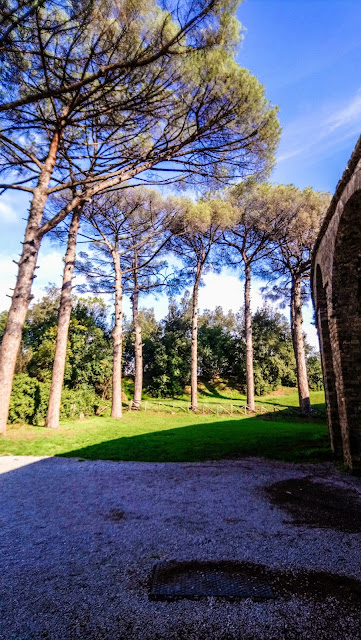At this point we had been walking without stop for about 4 hours, and the other two guys were loudly complaining about being tired and hungry and lagging behind, whilst the history buff alternately insulted, scoffed at and cajoled them in an effort to spur them on - "pair of useless British tourists, the two of you." I wasn't too tired, but was rather torn about my itinerary. The guys were going onto Sorrento after Pompeii, which was several stops down the train line. On the other hand, I really wanted to see and climb Vesuvius, so it was a toss up between these two. The sun went down at 4ish, which meant that I only had about 4 hours of daylight left (at that point it was noon), and interesting though Pompeii was, there are only so many ruined houses, latrines, flatbread ovens, vases and mosaics you can take in before they all start blending into each other. One of the other guys said as much, earning a scornful tut from the history buff. After much deliberation, my desire to see the volcano where it had all started trumped that of the apparently picturesque Amalfi coast-town. (Later on when I met the guys back at the hostel, they agreed that I had made the right choice, and said that I hadn't missed anything by not going to Sorrento.)
Last few in Pompeii. I can see myself coming back here in the future, maybe, but it's not going to be too high on my list of priorities - I think I've seen enough of Pompeii to clear my conscience. I would like to see Herculaneum, though. And next time I visit Italy I'd like to spend a bit of time in Naples properly, take some more time in Rome, and do a proper tour of the coast. I'd also like to see Pisa and Milan. One week in Italy really is not enough (just like one week was not enough for Romania, or Croatia..!). My visit this time was mostly focused on the historical sights, but I'd like to see more of the Italian Riviera, and the sealine.
As for Pompeii itself, and my thoughts? The experience was a bit surreal - the site had been commercialised so much that I found myself forgetting, at times, that this was in essence a massive graveyard, and not just a pretty open museum with ruins and pillars and temples. Even with the history buff's commentary and the introductory plaques at each site, it was sometimes easy to lose sight of the fact that a gigantic natural catastrophe had, two thousand years ago, devastated this town, and immediately terminated the lives of fifteen thousand people. Fifteen thousand lives, lost. I had to constantly remind myself of that fact, and to turn my eyes away from the incessant selfie sticks and people bumping into me because they were trying to get the perfect picture and weren't looking where they were going. This was unfortunately a real thing. I would look upon the desolate, lifeless, moss-grown ruins, but then Vesuvius would draw my eyes, looming large and ominously in the distance, too close for comfort, and I would remember what had happened in AD 79, and think of the ashes and bone dust of the people that lay dead beneath my feet. Tempus vita..



































































































